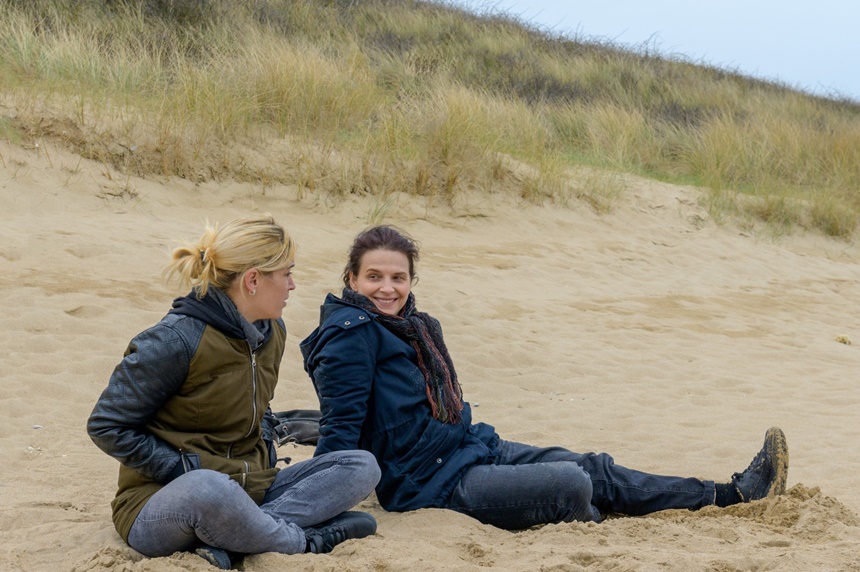Between Two Worlds
⭐️ ⭐️ ⭐️ ⭐️
Run Time: 1 hour 46 minutes
Stars: Juliette Binoche, Hélène Lambert, Didier Pupin, Léa Carne
Writers: Florence Aubenas, Emmanuel Carrère, Hélène Devynck
Director: Emmanuel Carrère
Anyone who’s enjoyed a cruise of any kind has had the experience of interacting with the ship’s cabin stewards. We’ve smiled at, chit-chatted with, and offered cash tips to those men and women who, almost invisibly, make the beds, clean the bathrooms, and maybe leave a chocolate mint (or two, if requested) on our pillows.
When we do encounter them, we make it a point to ask them about their home countries and their families, but there’s one conversational topic we tend to avoid like scurvy: their working conditions.
In the poignantly human French drama Between Two Worlds, an author named Marianne, played by Juliette Binoche, goes undercover among the housekeeping staff of a busy English Channel ferry, seeking to experience the unspoken lives of these anonymous seagoing servants. What she finds while making 40 beds an hour, cleaning half that many toilets, and doing it all nonstop for an 8-hour shift, is an underworld of frequent desperation, softened only by tender — and sometimes defiant — camaraderie.
But she also discovers something else: gnawing guilt, born of the knowledge that, unlike her coworkers, at any given moment she could chuck all this for a warm bed and comfy home. The closer Marianne gets to her unsuspecting co-workers, the more she dreads the inevitable day when she will have to reveal her true identity.
Based on an acclaimed book by Florence Aubenas — a successful writer who moved to a strange city to find unskilled work in the wake of the 2008 economic collapse — the film has a gritty immediacy, and not just because Binoche lets her hair get straggly and doesn’t wear makeup.
Determined to bring authenticity to the screen, aside from his star, co-writer/director Emmanuel Carrère has enlisted a cast of non-actors for virtually every role: real-life housecleaners, domestic workers, and unemployed people.
It’s a risky strategy: Often when professional actors mix it up with non-pros, the contrast can result in a film seeming like two separate movies.
The gambit worked brilliantly for Chloé Zhao and Frances McDormand in 2020’s Nomadland, and the payoff is even greater here. In that earlier film, the motorhome-based wanderers got to play their roles against vast scenic backdrops of the American West. Here, Carrère’s first-time cast is confined to tiny staterooms and cramped hallways, forcing a kind of big-screen intimacy that can foil even accomplished actors.
Miraculously, they are up to it — every single one. It is hard to imagine that slight, sad-eyed Hélène Lambert — playing a single mom scrubbing toilets to support her three children — was, until she landed this role, an actual single mom scrubbing toilets to support her three children.
I hesitate to even mention that, lest you think Lambert was simply plopped into the film to depict her real, sad self. On the contrary, Lambert creates a character that transcends her own personal history: forward-looking and ferocious. This will not be her last film. Nor will it be for any number of her fellow cast members, especially tousle-haired Didier Pupin, who, prior to appearing here as a charmingly flirtatious unemployed guy, was a carpet installer; and Léa Carne, a sweet-smiling former factory worker who plays one of Marianne’s most stubbornly optimistic fellow room stewards.
But it all works primarily because of Oscar-winner Binoche (The English Patient), who lays down her superstar glam to meet her costars on their own level, playing her scenes with them, rather than around them, yielding the film’s focus to become, like her character, primarily an observer.
You hear a lot about “generous” acting; here, Binoche gives a master class in the art.
Become a Saturday Evening Post member and enjoy unlimited access. Subscribe now




Comments
Thanks! This film might not have been on my radar without this review. Now I shall certainly watch for it.